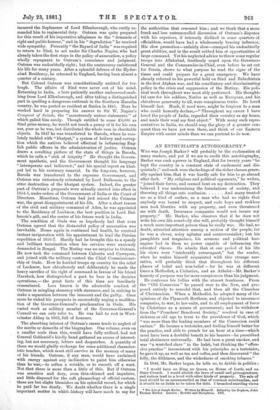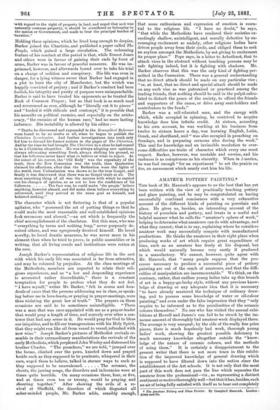AN ENTHUSIAST'S AUTOBIOGRAPHY.*
W110 was Joseph Barker? will probably be the exclamation of many readers, and yet if we are to credit this autobiography,. Barker was such a power in England, that for twenty years "he
kept the country in a constant state of excitement and dis- quietude ;" and such were the feelings of the richer classes gener- ally against him, that it was hardly safe for him to go abroad after dark. "My religious and political opponents," he writes, "joined their forces, and seemed bent on my destruction. They believed I was undermining the foundations of society, and throwing all things into confusion And many treated me as a kind of outlaw, as a man who had no rights that anybody was bound to respect, and rude boys and reckless men took liberties with my property, and even threatened me with death. Insurance companies would not insure my property." Mr. Barker, who observes that if be does not write his own life somebody else will, probably thought himself a much more important person than he really was. He had, no. doubt, attracted attention among a section of the people, for he was a clever, noisy agitator and controversialist ; but his pamphlets and magazines, his sermons and political har- angues had in them no power capable of influencing the educated classes. He admits that at one period of his life his views were "intolerably extravagant," but the reader, when he makes himself acquainted with this strange nar- rative, will probably think that throughout his different phases of belief and non-belief — for he was at different times a Methodist, a Unitarian, and an Atheist—Mr. Barker's; honesty of purpose was far more conspicuous than his judgment.
He confesses his follies with the utmost frankness. From the "Old Connexion" he passed over to the New, and pro- posed entirely to remodel that, and then all the Churches of Christendom. When a Methodist, he adopted many of the opinions of the Plymouth Brethren, and objected to insurance companies, to war, to law-suits, and to all employment of force by Christians as a means of government; and he withdrew from the "Preachers' Beneficent Society," resolved in case of sickness or old age to trust to the providence of God, which "was more than the leading members of the Connexion could endure." He became a teetotaler, and finding himself better for the practice, and able to preach for an hour at a time—which must have been a doubtful benefit to his hearers—he prescribed total abstinence universally. He had been a great smoker, and was "a wretched slave" to the habit, but thinking the "offen- sive practice" inconsistent with his principles as a teetotaler, he gave it up, as well as tea and coffee, and then discovered " the folly, the filthiness, and the wickedness of smoking tobacco." In 1846, Mr. Barker began, he tells us, to dabble in politics
"I would have no King, no Queen, no House of Lords, and no State Church. I would abolish the laws of entail and primogeniture, and reduce land to a level with other kinds of property. The sale of land should be as untrammelled as that of common merchandise, and it should be as liable to be taken for debt. I broached startling views • The Life of Joseph Barker. Written by Himself. Edited by his Nephew, John Thomas Barker. London; Hodder and Stoughton. 1881.
”with regard to the right of property in land, and urged that as it was .naturally common property, it should be considered as belonging to the nation or Government, and made to bear the principal burden of !taxation."
Holding these opinions, which he lived long enough to despise, Barker joined the Chartists, and published a paper called The People, which gained a large circulation. The redeeming feature of his conduct at this period is that, while Ernest Jones and others were in favour of gaining their ends by force of arms, Barker was in favour of peaceful measures. He was im- ,prisoned, however, and afterwards bound over to take his trial on a charge of sedition and conspiracy. His life was even in danger, for a lying witness swore that Barker had engaged in .a plot to burn the city of Manchester, but the wretch was happily convicted of perjury ; and if Barker's conduct had been foolish, his integrity and purity of purpose were unimpeachable. Barker is said to have treated his opponents as he treated the Book of Common Prayer ; but as that book is as much used and reverenced as ever, although he "literally cut it to pieces" and "loaded it with ridicule and contempt," it is possible that his assaults on political enemies, and especially on the exist°. .cracy, "the enemies of the human race," had no more lasting influence. His instability is allowed by his editor
4' Truths he discovered and expounded in the Evangelical Reformer were found to be no truths at all, when he began to publish the Christian Investigator. And further investigations into truth only fed him to discard his former notions in the pages of The Christian. And by the time he had brought The Christian to a close he had ceased to be a Christian altogether. He was always adopting new opinions, always advocating something fresh, always shifting his ground, so that his followers never knew what to believe or what to reject. At the outset of his career, the Old Body' was the repository of the truth, then the New Connexion was the truth, then Quakerism claimed his affections, after that the Barkerites were the lights of the world, then Unitarianism was shown to be the true Gospel, and finally it was discovered that there was no Gospel truth at all. The most surprising thing of all was the success with which he carried .cut his changes of opinion, so as not to lose the confidence of his
followers The fact was, he could make the people' believe anything, however absurd, and did make them believe everything he advocated, until they arrived at the same goal as himself, and believed nothing."
The character which is not flattering is that of a popular agitator, who "possessed the art of putting things so that he -could make the most reasonable and well-established opinions .look erroneous and absurd,"—an art which is frequently the chief accomplishment of the charlatan. But this man, who was 4‘ everything by turns and nothing long," never purposely de- ceived others, and was egregiously deceived himself. He loved novelty, he loved drastic measures, he was never more in his element than when be tried to prove, in public assemblies or in writing, that all living creeds and institutions were rotten at the core.
Joseph Barker's representation of religions life in the sect with which his early life was associated is far from attractive, and may be coloured by prejudice. At the class meetings of the Methodists, members are expected to relate their reli- gious experiences, and as "a low and desponding experience is accounted rather discreditable," there is a constant temptation for people to profess what they do not feel. -" I have myself," writes Mr. Barker, "felt in scores and hun- dreds of cases that the persons addressing me in class, or speak- ing before me in love-feasts, or praying in prayer-meetings, were thus violating the great law of truth." The prayers on these occasions are said to be sometimes unintelligible. "There was a man that was once appointed with me as a prayer-leader that would pray a length of time, aud scarcely ever utter a sen- tence that had any sense in it. He would pray for God to bless our iniquities, and to fill our transgressions with his Holy Spirit, that they might run like oil from vessel to vessel, refreshed with new wine." Joseph Barker's pictures of Methodist revivals re- semble in their extraordinary manifestations the revivals of the -early Methodists, which perplexed John Wesley and distressed his brother Charles. "The preachers," we are told, "jumped over the forms, climbed over the pews, kneeled down and prayed beside such as they supposed to be penitents, whispered in their ears, urged them to believe, talked in sterner ways to such as they supposed to be unawakened The screams, the shouts, the jarring songs, the disorders and indecencies were at times quite horrible. On many occasions three, four, or five, and at times even ten or twenty, would be praying and shouting together." After showing the evils of a re- vival at Sheffield, the disorders of which disgusted all sober-minded people, Mr. Barker adds, sensibly enough, that some enthusiasm and expression of emotion is essen- tial to the religious life. "I have no doubt," he says, "that while the Methodists have rendered their societies ex- ceedingly shallow, unintelligent, and morally defective by en- couraging excitement so unduly, other religious bodies have driven people away from their circle, and obliged them to seek an asylum amongst the Methodists, by not giving to excitement its proper place." Pope says, in a letter to Arbuthnot, that to attack vices in the abstract without touching persons may be safe fighting indeed, but it is fighting with shadows. Mr. Barker observes that this was the only kind of fighting per- mitted in the Connexion. There was a general understanding that no direct attack should be made on any particular vice ; "or, at least, that no direct and special attack should be made on any such vice as was patronised or practised among the leading friends, that nothing should be said in the pulpit calcu- lated to disturb the peace of the society, to offend the friends and supporters of the cause, or drive away seat-holders and contributors to the funds."
Barker was a self-educated man, and the energy with which, while occupied in spinning, he contrived to acquire knowledge does him infinite credit. At sixteen, according to his own account, he was working at his business from twelve to sixteen hours a day, was learning English, Latin, Greek, and shorthand, and" was also occupied in preaching on Sundays, and in preparing sermons also during the week." This zeal for knowledge and an invincible resolution to over- come difficulties are traits of character which every one must respect. Barker, however, was unstable and unwise, and his rashness is as conspicuous as his sincerity. When in .A merica, he was fool enough "for an experiment" to set the prairie on fire, an amusement which nearly cost him his life.



































 Previous page
Previous page